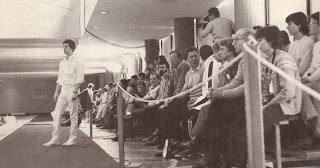What Joy added to the conversation was an observation that the Bantam Girls she coaches have started to make comments about referee calls, and my calls when reffing practices, that they have zero knowledge about ie the comments do not come from an informed position. This attitude is being passed on to them by the role models they have present at practice. That bit of information resonated with the player and there was some reflection.
What I tried to say to diffuse the athlete frustration was that coaches referee at practice to lead players and teams to certain places. Sometimes there is refereeing exactly as we expect at events, sometimes we bring referees to practice or scrimmage, sometimes coaches want to show athletes what habits they have developed that got them into foul trouble at a recent tournament. This last piece is important because explaining a major foul to a player during a game or right after, when they are frustrated, does not always sink in. So recreating the major foul at practice when they do something similar is a good teaching point.
BUT, players should NEVER focus on what a referee calls other than to adjust their play accordingly. Accept the call and take what opportunities are presented no matter how smart, right or stubborn you may be. Even if the whole world knows the referee is wrong, like that LA ref who yellow carded me at Alberta Open!
Interestingly enough I have recently read an interview with a European 17 year old who will play NCAA water polo next year. In that interview he makes a perfect comment about referees so I copy the question and answer here with full credit to waterpoloplanet.com
Taken from "An Interview with Lithuanian LMU Recruit Ed Asajavicius".
WPP- You have played water polo in the United States several times, including in the summer leagues,Premier League D1, Junior Olympics and Commerce Invitational. What are the differences in the way the game is played in Europe and the USA?
Sure, they put a smiley face after his remark but that just emphasizes that we all know EVERYBODY is concerned about referee calls. The point is, there is nothing players can do about it so just focus on what you can control and let coaches or event organizers deal with referee issues.EA- Since refereeing is not something a player should be concerned about :), there are not many differences I can think of. One team has to score more goals than the other to win, water polo is the same everywhere.
Now, just to give everyone a good laugh, here is a picture of me the day I was certified as a National referee in Canada. It was during the Gold Medal final of the mens division at the 1983 Canada Games in Quebec. Note the stylish white uniform that has not changed in 25 years. I was using an Acme Thunderer whistle and carrying a 2 colour referee flag; those things have certainly changed.
The game was won by Quebec, boo hoo, since I was from Ontario at the time and coached some boys on the Ontario team. On the other side of the pool was Micheline Landry who remains, to this day, a National Referee and has been at that level since this day in 1983.
Why do I put this picture up today? Because in 1983 we had to be selected by the 2 teams in the final to be the game ref. Neither coach wanted "neutral" refs from other provinces, they wanted people they knew and could trust to not influence the game with politics or ego. This is important because even though it was 25 years ago it reflects that I have "walked a mile" in the shoes of a referee in key games. I've done this many times more since then and I know when to follow the FINA rules and interpretations and when to push an athlete to be more than they are accustomed to be in daily practice.
Hopefully a picture of me reffing with my eyes closed will give the players reading this a laugh. That might allow them to reflect and to understand that I don't referee any scrimmage to be mean and never from a position ignorance.


Well, I know this post is rather old, but bear with me, I just discovered the blog today.
ReplyDeleteAs someone who has been on both sides, one of the frustrated players as well as one of the referees I know how hard it is for each.
The players are worried about the referees because they are in a position of power. No matter what they do, the referee can influence the situation. With this they can feel less control and get frustrated. The frustration affects their game play and can cause more calls to be made. The more calls that are made, the more the players are going to focus on the referee and what they are calling, instead of focusing on the game play.
Just on a reffing note, I really hated reffing when our team is playing another team. I tried to be as unbiased as possible, but is it really possible to be unbiased? You know the people on your team and could have developed relationships with them. You don't want to see them lose, but you want to come off as fair as possible. This can cause you to either be slightly biased in helping your team, or it may be completely the opposite where you are harsher on your team so that you seem fair.
Sorry, that last bit really doesn't relate to the post as much, but it is just something that I believe when looking back on things.